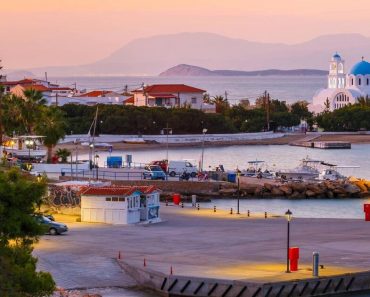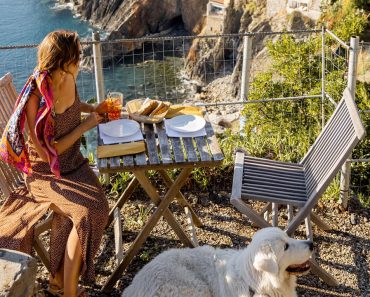1 Six in a double room
Every generation since the restoration of democracy got its first experience of summer independence with a week on a Cycladic island. Santorini, Mykonos, Serifos, Ios, Anafi – the list is personal and potentially endless. It’s only today’s 20-somethings that have been excluded from this once-important rite of passage due to the rocketing cost of a trip anywhere in the Aegean after the Covid-19 pandemic. But the Greek Generation Z has discovered its own tricks to bring the Cycladic dream a little closer. From spending the night on the beaches with sleeping bags (to avoid the cost of accommodation) to renting double and triple rooms for groups of six and seven people, without the knowledge of the unsuspecting owners, thousands of Greek high school graduates and young college students will do everything to experience what they have been hearing about for years from their parents.
2 Ceviche stew
After the onslaught of imported raw foods (i.e. ceviche, tartare, sashimi, etc) a new and bold version takes its place at the top of the menus of restaurants, hotels and, more recently, tavernas that wish to show their customers that they follow the latest trends in domestic gastronomy. After accepting that there can be no self-respecting Greek island menu without international raw foods, and with the conviction that their execution has been perfected under the Greek sun, we are, as things show, heading for the next level: namely, the cultural appropriation of the raw foods in question through imaginative dishes such as “fish tartare fricassee,” “ceviche stew,” and “egg and lemon sashimi” that are making waves on the Greek islands this year. All you need is imagination and anything is possible.
3 The sold-out beach
It’s like you’ve been on vacation but you’ll be back home in the evening. It’s like you’ve flown to Mykonos but somewhere in the background, Kastella and Piraeus emerge, instead of the classic Cycladic windmills of Mykonos or some celebrity. The organized beaches of the Athenian Riviera – mainly around the theoretically more privileged zone of Vouliagmeni – have mushroomed and become increasingly expensive after the Covid-19 pandemic, but they have also cultivated a new lifestyle of seaside culture and entertainment with prices that far exceed 100 euros per couple (without any other services used), price lists depending on the sunbed’s proximity to the water, online pre-reservations, consecutive sold-out weekends and astronomical consumption reminiscent of Mykonos. Its dynamic is such that a special application – called Plazz – was required for businesses to manage the huge demand, especially for weekends.
4 Then came the jellyfish
A few summers ago it was the Corinthian Gulf. This year the honor goes to the Pagasetic and Euboea (Evia) gulfs. Purple jellyfish (Pelagia noctiluca) claim an increasingly greater presence in Greek seas every summer, disrupting not only bathers but also the local economies of the affected coasts as the news travels quickly. Their sting is considered painful and potentially dangerous, with experts recommending specific instructions for dealing with them. And this new wound on the ravaged body of the once-carefree Greek summer is attributed to climate change and overfishing. Tropical species of jellyfish are migrating to Greek waters while at the same time the jellyfish’s predators, such as bogue breams, are decreasing. And as if all this were not enough, the increase in marine infrastructure facilitates the life cycle of jellyfish and can help increase their population, according to scientists.
What is more economical? A week in Folegandros or a trip to Copenhagen and Stockholm? The dilemma is real for a rising number of middle-class Greeks
5 Paros or Paris?
What is more economical? A week on Folegandros or a trip to Copenhagen and Stockholm? The dilemma is real for a rising number of middle-class Greeks: If the ship and the accommodation on the islands alone have a budget for a once-ambitious escape to a major European capital and possibly a stay in a good hotel, should we pick the latter over an island? Data from the Hellenic Statistical Authority revealed that in 2024, Greeks spent more on trips abroad (2.8 billion euros) than on trips domestically (2.2 billion euros). And it seems that the trend of previous years has come to stay. The closing of the gap between the two options will send more Greeks for relaxation in Berlin and Madrid rather than on Sifnos and Amorgos.
6 Panigyria everywhere
It was only a matter of time before the sudden, sweeping popularity of Greek panigyria (traditional church-centered celebrations held by communities to celebrate the feast days of local patron saints) after the pandemic ended, their identification with Gen Z, the exculpation of tradition and clarinets, the collective and physical experience of group participation in an era of digital autism, would detach it from its physical context – the village square, the island chapel – and transport it to the cities. This is usually done in the form of newly minted “traditional music festivals.” These urban festivals may not claim the same degree of authenticity as their distant, rural relatives, but they are likely motivated by the same need.
7 Pop-up tent
It opens easily, offers ample shade and gives the impression of a small tent that can accommodate at least a small family – and a portable cooler. And the dog. These beach tents, available in a variety of sizes (starting from the simplified version of a fancy sunshade), are the new, ultimate accessory on Greek beaches at a time when the cost of two sun loungers and a classic umbrella has skyrocketed. As legislation obliges entrepreneurs who rent parts of the shore to leave free areas on the beaches for those who do not want the services of a beach bar, these new type of tents often resemble Greek kiosks. In other words, they are characterized by particularly expansive tendencies to the detriment of more traditional bathers who arrive with the old-fashioned towel and beach umbrella.
8 No longer champions
Things do not seem to be going very well for the national champions of our tourism industry. The worrying messages of last season have been confirmed this year. Santorini is the loser of the season – largely due to the intense seismic activity at the beginning of the year – Mykonos is stabilizing but at considerably lower levels compared to the records of 2022 and 2023, while whispers about relatively low occupancy rates in the heart of the tourist season are also heard from the hoteliers of Halkidiki in northern Greece. The profile of the three destinations may be different, but the causes for the decline seem to be common: overtourism, skyrocketing accommodation prices, construction excesses, alienation of potential Greek customers.
9 Dinner at the Airbnb
Full hotels, full beaches but half-empty tavernas and restaurants. Something is wrong with traditional tourism trends and the reason is the significant shift in the consumer behavior of visitors, Greek and foreign, with the most important being the decision to eat and drink in their accommodation (Airbnb or other short-term rentals) and not at traditional dining venues. Visitors are purchasing the necessary supplies from the increasing number of supermarkets on the islands and other tourist destinations, and cooking in the comfortable kitchens of their expensive apartments, somewhat reducing the already inflated vacation budget. This year, there is increased demand in supermarkets for coffee, alcoholic beverages and ready-made drinks, while the trend is spreading to all consumer profiles, affecting higher-income tourists as well.
10 No camper vans
It took a fine on camper van owners in the area of Akrata, Western Greece, to reveal a legislative regulation from last January that made life very difficult for their drivers in Greece. The regulation prohibited not only parking for a few days (which was already prohibited), but also short-term parking at archaeological sites, seashores, beaches, the edges of public forests and public spaces in general. The news spread very quickly – as is the case with everything in the internet age – and the market for the approximately 50,000 motorhomes that visit us every summer, mainly from Central European countries, was lost for this year. The new road traffic code attempted to repair the damage by restoring things to the previous regime, but the damage had already been done.







